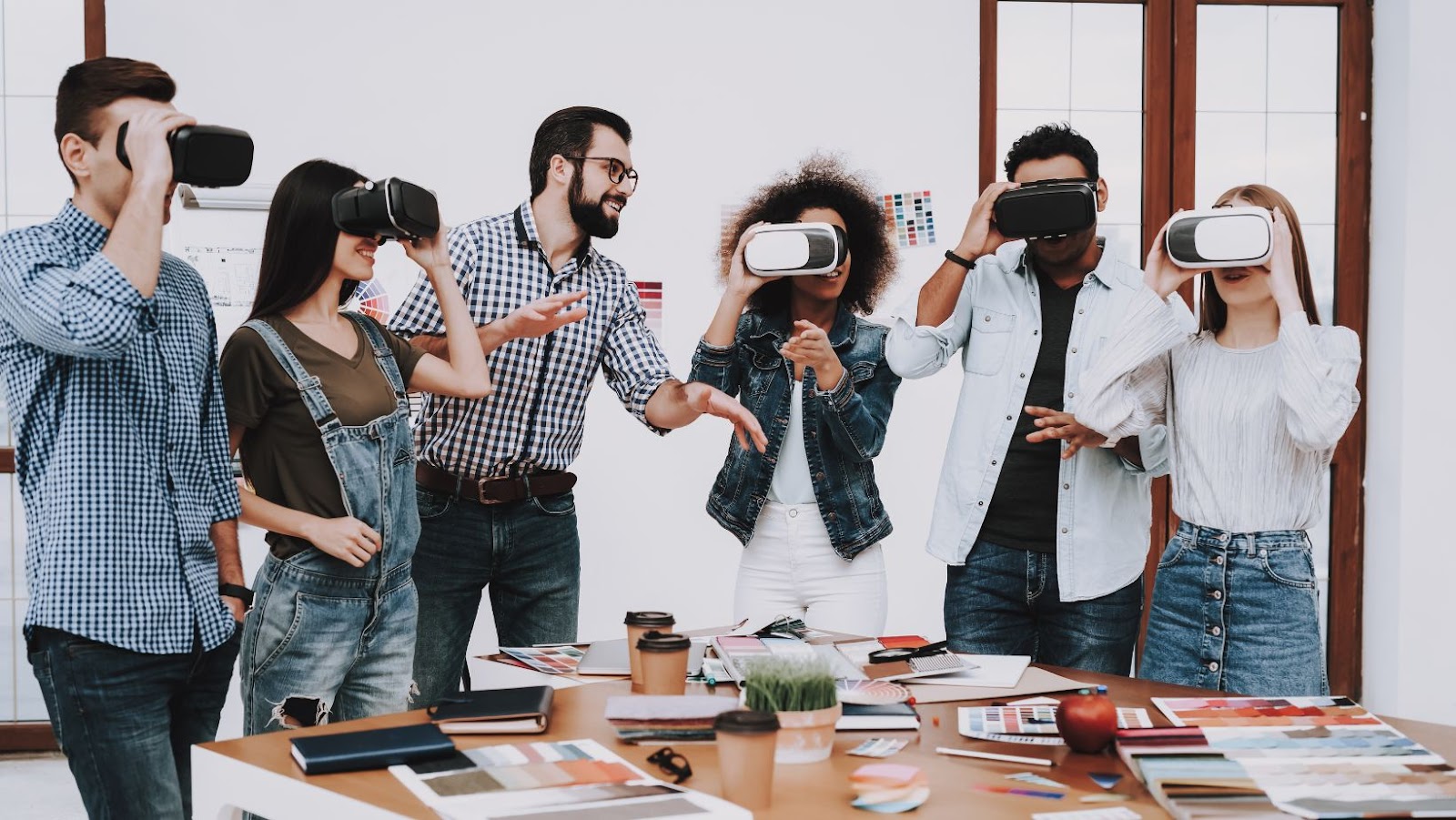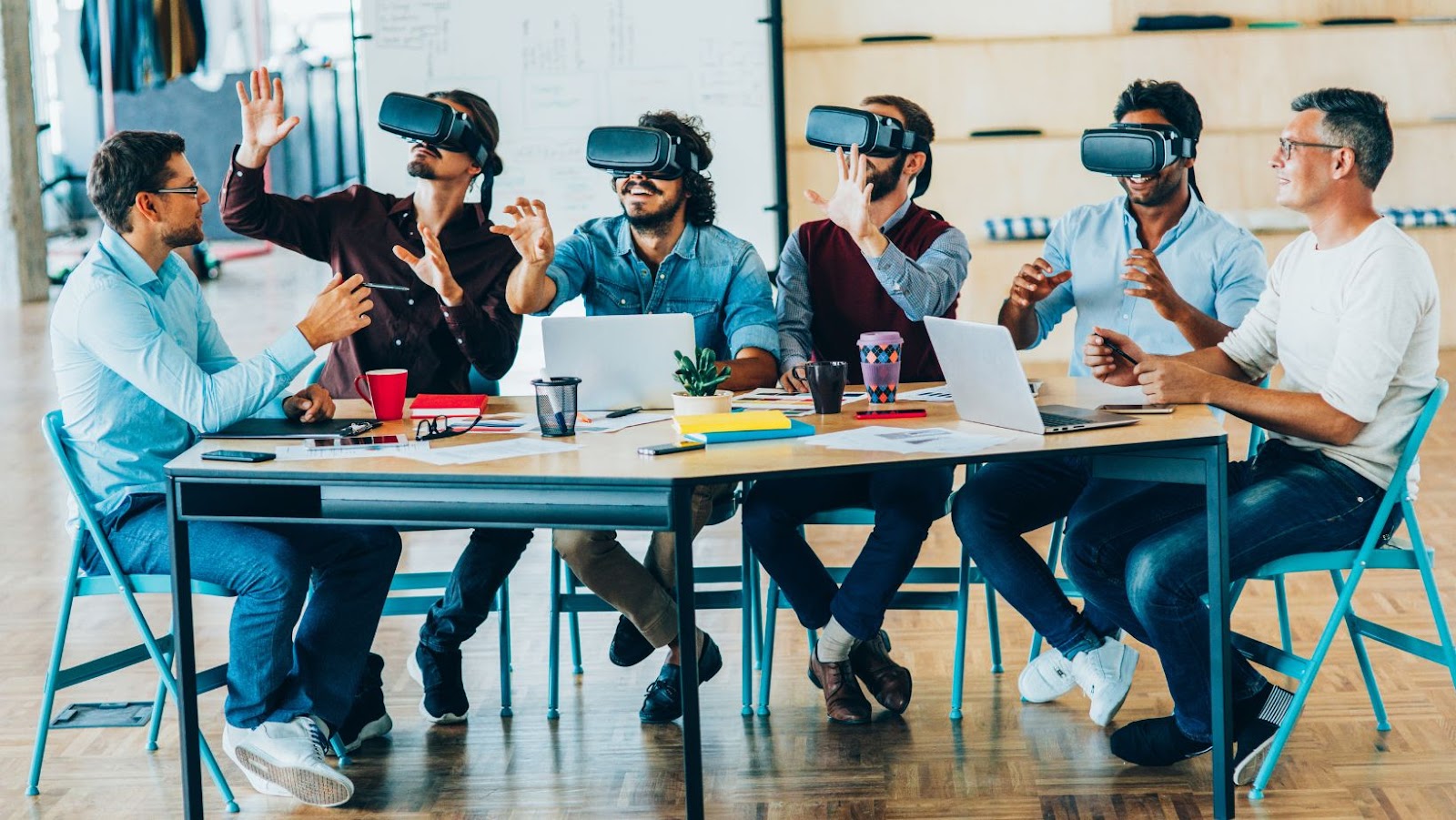 Virtual Reality Workshop
Virtual Reality Workshop
Virtual reality workshops combine advanced VR technology with interactive learning. Participants use VR headsets to enter immersive, 3D environments where they can interact with digital objects and collaborate in real-time. These workshops offer a unique, hands-on experience by simulating real-world scenarios, making abstract concepts more tangible.
- Enhanced Engagement: Participants engage deeply with content, leading to better retention.
- Safe Environment: Users can practice skills without real-world risks, useful in high-stakes fields like medicine.
- Immediate Feedback: Real-time responses help improve performance quickly.
Applications in Various Fields
- Corporate Training: Employees can participate in virtual training sessions, enhancing skills in a controlled environment.
- Education: Students explore complex subjects through interactive simulations, making learning more effective.
- Healthcare: Medical trainees practice surgical procedures in a risk-free setting.
Virtual reality workshops necessitate specific equipment for optimal functionality:
- VR Headsets: Devices like Oculus Rift and HTC Vive provide immersive experiences.
- Controllers: Hardware enabling interaction with the virtual environment.
- Computers: High-performance systems ensuring smooth operation and graphics rendering.
Advancements in technology will likely expand VR workshop applications. Expect growth in fields like remote collaboration, advanced simulations, and personalization of learning experiences.
Virtual reality workshops are redefining educational and professional landscapes, paving the way for innovative approaches to learning and skill development.
 Key Components of a Virtual Reality Workshop
Key Components of a Virtual Reality Workshop
Virtual reality workshops rely on several essential elements to create an effective and immersive experience. They integrate specific hardware, software platforms, and content creation tools.
VR workshops need specialized hardware to function. The primary components include:
- VR Headsets: Devices like the Oculus Rift and HTC Vive offer high-resolution displays and motion sensors, enhancing the immersion.
- Controllers: Hardware such as handheld or motion controllers allows users to interact with the virtual space.
- High-Performance Computers: Machines with robust CPUs, GPUs, and RAM are vital for running VR software smoothly.
The success of a VR workshop depends on reliable software platforms:
- VR Operating Systems: Platforms like SteamVR and Oculus Home act as the foundation for VR applications.
- Development Environments: Software like Unity and Unreal Engine are used to build and program VR experiences.
- Virtual Meeting Software: Tools like AltspaceVR and VRChat facilitate real-time, interactive virtual environments for collaboration.
- 3D Modeling Software: Applications like Blender and Autodesk Maya help design detailed 3D assets.
- VR Animation Tools: Software like Cinema 4D and Adobe Animate creates animations that enhance the virtual experience.
- Scripting Languages: Tools such as C# and Python are used for developing interactive scripts to bring VR environments to life.
 Benefits of Attending a Virtual Reality Workshop
Benefits of Attending a Virtual Reality Workshop
Virtual reality workshops offer numerous advantages that traditional methods cannot match. These benefits span various aspects, including learning, networking, and practical application.
Virtual reality workshops provide immersive learning experiences. Participants grasp complex concepts more effectively since they interact with 3D models, simulations, and virtual scenarios. For instance, medical students can practice virtual surgeries, understanding intricate anatomy without real-life risks. This approach enhances retention and comprehension, making learning more engaging and impactful.
Attending virtual reality workshops connects individuals globally. These workshops enable real-time interaction, allowing participants to network with industry experts and peers across the world. For example, a software developer from Europe can collaborate with a designer in North America, sharing insights and building professional relationships. This global connectivity enriches the learning environment and opens doors to new opportunities.
Virtual reality workshops offer practical, hands-on experiences that are often impossible in traditional settings. Participants can manipulate objects and navigate virtual environments, gaining real-world skills in a controlled, safe space. For example, engineers can prototype and test designs in a virtual lab, identifying issues before physical production. This hands-on approach accelerates learning and skill application without the limitations of physical resources.
Virtual reality workshops are revolutionizing the way individuals learn and collaborate. By offering immersive, hands-on experiences, they make complex concepts more accessible and engaging. These workshops cater to various fields, from corporate training to healthcare, providing a safe environment for skill practice and immediate feedback.